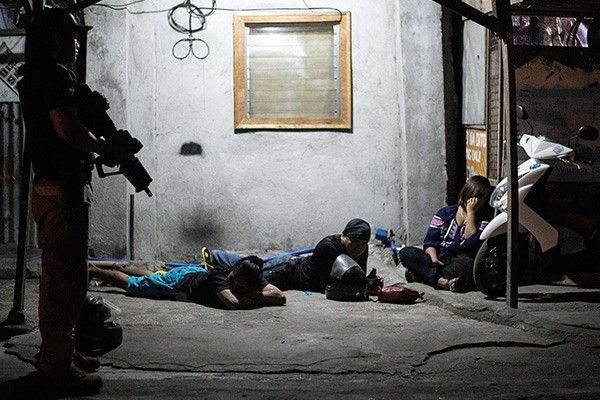Majority of Filipinos see human rights violations in 'failing' drug war — SWS

MANILA, Philippines — Most Filipinos believe that the government's campaign against illegal narcotics came with numerous human rights violations, a new Social Weather Stations survey showed.
According to the latest survey by the SWS, 76% of Filipinos surveyed saw "many" human rights abuses in the administration's war on illegal drugs, while 24% saw only a few.
Furthermore, 49% of Filipinos were in agreement while 21% were in disagreement that the removal of Vice President Leni Robredo as co-chair of the Inter-agency Committee on Anti-illegal Drugs was an admission by the administration that the drug war was failing.
READ: Duterte's offer for Leni not an admission that drug war failed — Panelo
Some 56% of respondents also agreed with the United Nation's move to investigate the summary executions linked to the administration's campaign.
'Failing' drug war
However, Malacañang on Monday slammed the findings, saying the administration's anti-drug campaign was "demonized" by President Rodrigo Duterte's critics who gave it "undeserved currency."
"A lie repeated many times over is somehow stamped with a perception of truth," presidential spokesman Salvador Panelo said in a press briefing.
The Palace previously welcomed a separate survey also by the SWS that listed the satisfaction rating of the chief executive as "very good."
In the SWS survey, 60% of respondents said they believed Robredo had the right to see the government's list of high-value targets linked to the drug trade in the country, one of the pieces of information that Duterte kept from Robredo.
Duterte's so-called "war on drugs" was recently criticized after Robredo released a report last week detailing her comments and recommendations from her short tenure in ICAD, which lasted only eighteen days.
In presenting her recommendations, Robredo called the anti-drug campaign a "failure" and consequently drew the ire of many administration allies, who said her report was a mere political move. The vice president added that she was only echoing a sentiment that Duterte himself expressed years ago. As early as 2017, the chief executive admitted that his drug war was "not winnable."
During his campaign to the presidency, Duterte promised to end the drug problem within six months of his election.
Three years into his term, he has asked for numerous extensions for his self-imposed deadline, eventually giving up on the initial timeline altogether.
Human rights violations
Asked the question "In the course of the administration’s war on illegal drugs, would you say that the number of abuses of human rights, for example, the extrajudicial killings or EJKs, has been Very many, Somewhat many, Only a few, or Very few?" in the SWS survey, 33% of respondents answered "very many," while 42% said "somewhat many."
Even the international community has slammed the ongoing war on drugs.
"Allegations of drug-trafficking offenses should be judged in a court of law, [and] not by gunmen on the streets," UN rapporteurs Agnes Callamard and Dainius Puras said about the extrajudicial executions last August 2016, at which point more than 850 people had already been killed since Duterte's election in May.
Most recently, the US Senate passed a resolution that called for sanctions on "members of the security forces and officials of the Government of the Philippines responsible for extrajudicial killings" among others.
RELATED: UN rights chief criticizes Duterte's drug war, calls for public health approach
The aforementioned resolution also invoked the Global Magnitsky Human Rights Accountability Act, which gives the executive branch of the US government the power to impose financial sanctions and travel restrictions on those it deems to be human rights violators.
Malacañang has consistently said that extrajudicial killings are not state policy, even claiming in multiple press briefings that democracy is flourishing and that the rule of law continues to prevail in the country.
RELATED: The War on Drugs: In-depth reports and analyses on the government's bloody anti-narcotics campaign
Although the Philippine National Police officially links around 5,500 of these killings to official police operations, rights groups both local and international such as Amnesty International, the United Nations and Human Rights Watch, say the death toll is actually closer to 27,000.
- Latest
- Trending






























